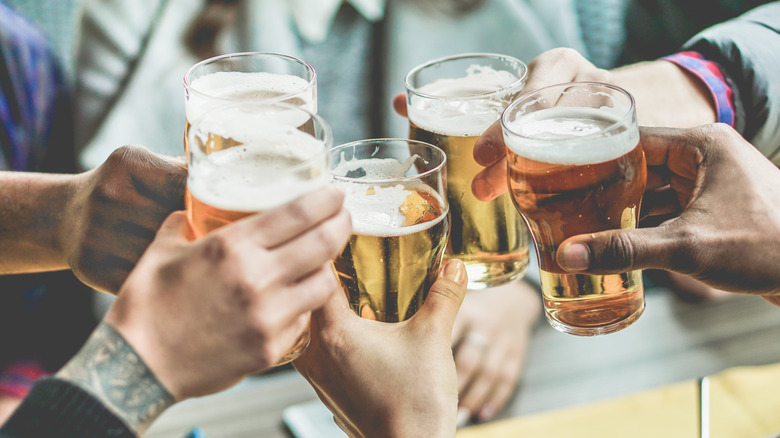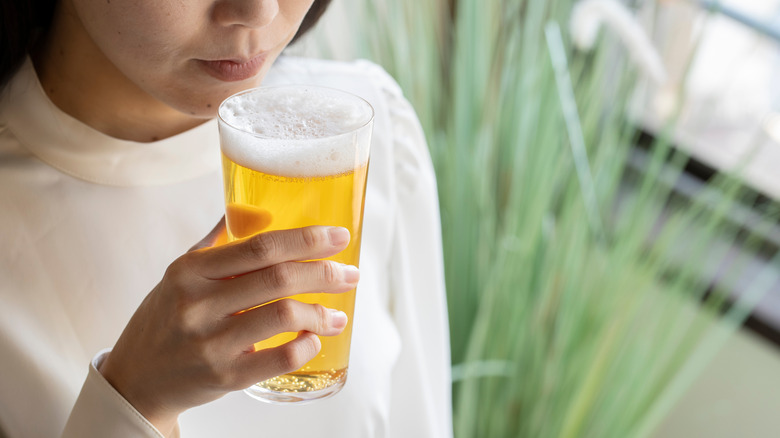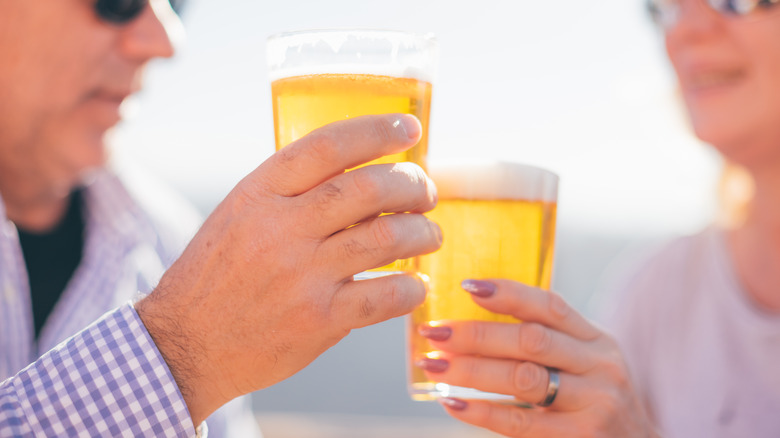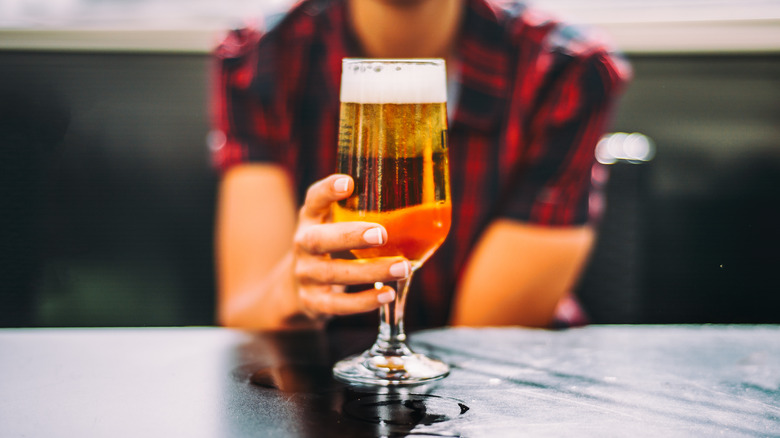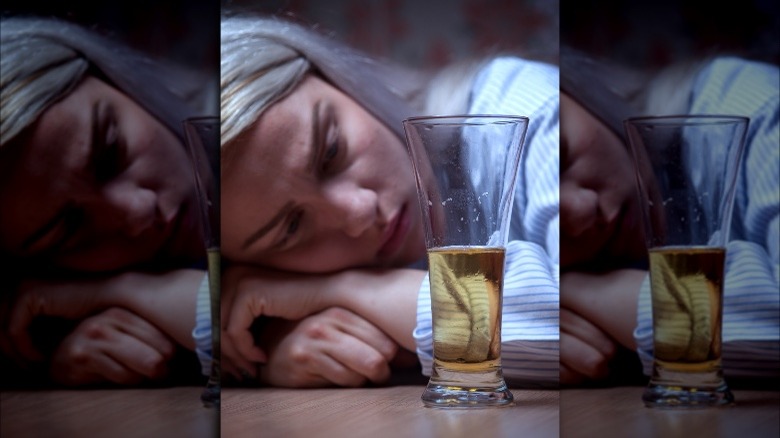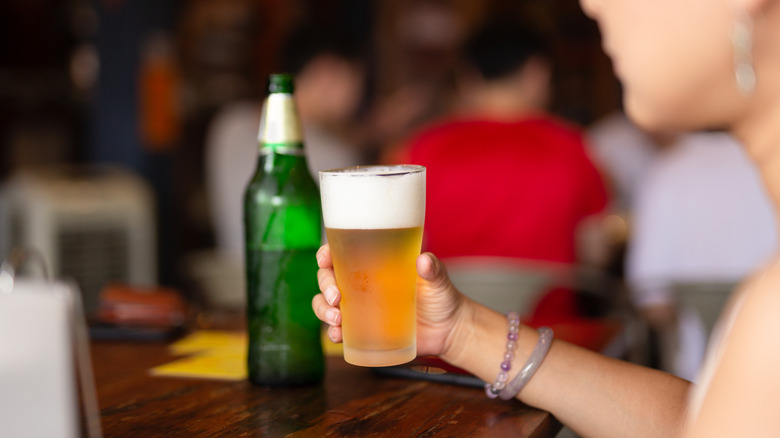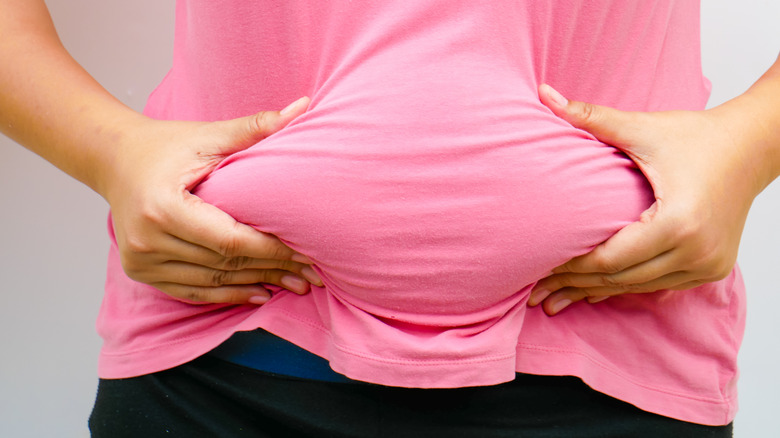When You Drink Beer Every Night, This Is What Happens To Your Body
If you drink beer every night and it's become part of your nightly routine as a way to kick back and relax after work, you might start to wonder how that's impacting your health. According to WebMD, doctors caution against "at-risk" or "heavy" drinking, which means drinking more than three 12-ounce servings (about three cans) daily or seven 12-ounce servings over the course of a week for women. Medical professionals also warn against binge-drinking — that is, drinking five or more servings of alcohol on one occasion at least one day in the past 30 days. That doesn't mean you can't have any beer, of course.
Mildred Bowers, a woman who celebrated turning 103 years old in 2016, credited her daily four o'clock beer — which was okayed by a doctor — with her longevity. "Have a beer, doctor's orders," she joked in an interview with her local news station.
So, could the fountain of youth actually be a keg? Well, the benefits — and consequences — of beer vary greatly by how much you drink. According to science, this is everything that happens to your body when you drink one beer — or one too many — every night.
If you drink beer every night, you could lower your risk for heart disease
It may sound far-fetched, but drinking beer may just stave off heart disease. Researchers at Brigham and Women's Hospital in Boston, Mass. found that men and women who drank up to seven drinks each week experienced a significantly lower risk — 20 percent in men and 16 percent in women — of heart failure when compared to people who abstained from alcohol.
"These findings suggest that drinking alcohol in moderation does not contribute to an increased risk of heart failure and may even be protective," said Scott Solomon, the study's lead author, professor of medicine at Harvard Medical School, and senior physician at Brigham and Women's Hospital, in a public release. "No level of alcohol intake was associated with a higher risk of heart failure. However, heavy alcohol use is certainly a risk factor for deaths from any cause."
Still, Solomon cautioned that although the study shows "an association between drinking moderate amounts of alcohol and a lower risk of heart failure," it "does not necessarily mean that moderate alcohol consumption causes the lowered risk."
Drinking beer every night could make you more prone to cancer
According to a 2018 study (via Discover), alcohol is the third-leading cause of death in the United States. The World Health Organization (WHO) also states that "alcohol use is a risk factor for many cancer types including cancer of the oral cavity, pharynx, larynx, oesophagus, liver, colorectum and breast." But there's a little more to the story.
"While alcohol causes seven types of cancer, the risk of most of these cancers does not increase significantly until an individual starts drinking heavily," Theresa Hydes, a researcher at the United Kingdom's University Hospital Southampton, told Discover magazine. However, she noted that breast cancer is the anomaly. The expert continued, saying, "At moderate levels of alcohol intake (for example 10 [drinks] a week) the risk of breast cancer goes up more than it does for other alcohol-related cancers."
That said, Hydes said consuming one to two cans of beer a few times each week is "probably not harmful." Still, she echoed the sentiments of many other professionals: "[But] people who don't drink shouldn't start drinking."
If you drink beer every night, you may live longer
Although Mildred Bowers, who made headlines for turning 103 in 2016, recommends beer for others who want to live into their 100s, she said her longevity is really "all in the genes." She continued, telling her local news station, "I feel okay because I'm in good health."
As it turns out, though, a study later confirmed that both light and moderate drinking does indeed decrease the risk of mortality in both sexes — but especially so in women, as reported by The Telegraph. In fact, moderate drinking attributed to a 25 percent decrease in "all-cause mortality" and a 34 percent decreased risk of cardiovascular disease-related mortality in women.
"A J-shaped relationship exists between alcohol consumption and mortality, and drinkers should drink with consciousness," Sreenivas Veeranki, the study's co-author and assistant professor in preventive medicine and community health at University of Texas Medical Branch, told The Telegraph. Giovanni de Gaetano, director of the department of epidemiology and prevention at IRCCS Istituto Neurologico Mediterraneo Neuromed, added, "For most older persons, the overall benefits of light drinking, especially the reduced cardiovascular disease risk, clearly outweigh possible cancer risk."
But it's also possible to have a shorter life if you drink beer every night
Not every medical expert believes drinking beer can lead to a long life. After reviewing large quantities of data, physician scientist Sarah M. Hartz revealed that "even the lightest daily drinkers have an increased mortality risk." She continued, telling Medical News Today, "A 20 percent increase in risk of death is a much bigger deal in older people who already are at higher risk. Relatively few people die in their 20s, so a 20 percent increase in mortality is small but still significant."
But what about the benefits to heart health? Hartz acknowledged that those benefits are real. "Consuming one or two drinks about four days per week seemed to protect against cardiovascular disease," she explained, "but drinking every day eliminated those benefits."
So, should you or should you not be drinking a nightly beer? Unfortunately, the science very much depends on you. "If you tailor medical recommendations to an individual person, there may be situations under which you would think that occasional drinking potentially could be helpful," Hertz revealed.
You could become dependent if you drink beer every night
Having a beer every night doesn't mean you're addicted to alcohol. But it can mean you've developed a dependence. "Dependence often goes hand in hand with addiction, but they're not the same things," George Koob, director of the National Institute on Alcohol Abuse and Alcoholism, explained to Men's Health. "You can become dependent on almost any substance if it's part of your daily rhythm, but that doesn't mean you're addicted." As such, dependence isn't unique to beer or even alcohol.
Koob further revealed to the publication that you could also become dependent on something an innocuous as eating dinner at the same time every night. "Anything that disrupts your normal routine is going to put you on edge," he explained, "but that's not an indication you have a use disorder."
Nevertheless, it is wise to pay attention to your consumption habits. "If one or two drinks is your baseline, but you drink more when you've had a rough day or week, that's something that could become a significant problem when life changes lead to stress," Paul Lavella Jr., a licensed clinical alcohol and drug counselor, told the publication.
Drinking beer every night may strengthen your brain
Drinking alcohol in excess can lead to devastating effects on the brain, including brain shrinkage and damage. However, low to moderate alcohol consumption can actually benefit the brain. "While heavy drinking may lead to dementia in later life, some studies suggest that low to moderate consumption of alcohol — one drink a day for women, two for men — might be beneficial for brain health," Cognitive Vitality, a program of Alzheimer's Drug Discovery Foundation, reported. However, you should take this with a grain of salt because, according to the publication, "it is difficult to know whether the beneficial effects are due to alcohol or other factors, such as lifestyle, education, or diet."
Although many medical professionals and experts — including George Koob, director of the National Institute on Alcohol Abuse and Alcoholism (via Men's Health) — don't recommend you start drinking if you don't currently drink (and not drink more if you only drink a little), consuming alcohol in low and moderate levels is thought to be safe for the brain. So, having a beer now and then is usually considered fine.
Concerned about your drinking habits? Here are signs you drink too much.
You could lower your risk for diabetes if you drink beer every night
According to a study conducted by researchers from the department of nutritional physiology at TNO Nutrition and Food Research institute as well as the Institute for Research in Extramural Medicine, department of public and occupation health, and department of endocrinology at VU University Medical Center in the Netherlands, moderately consuming alcohol can lower your risk of developing type 2 diabetes by as much as 30 percent.
However, if you currently have type 2 diabetes, you'll want to exercise more than the usual amount of caution when drinking — especially when it comes to what you're drinking. "For me, beer will raise my blood glucose, while a martini will cause it to fall a little," Donna Kay, a resident of Kansas who was diagnosed with type 2 diabetes in 2003, told Health. "I avoid drinks with fruit juice or a lot of sugar, such as a cosmopolitan or a piña colada. They are not worth the blood sugar spike or the calories." Note: For people wanting to avoid too much sugar, there are quite a few mixed drinks you shouldn't be drinking.
According to John Hopkins Medicine, light beer can be a better choice than regular beer because it contains "less alcohol and fewer calories."
Drinking beer every night could strengthen your bones
Move over milk — brewski is here to strengthen our bones. For real. According to a 2010 study conducted by researchers from the department of food science and technology at the University of California, Davis, beer was found to be an abundant source of dietary silicon, which can increase bone mineral density and may, in turn, help prevent osteoporosis.
Those of you who like hoppy or malty beers will see the most of these benefits. "Beers containing high levels of malted barley and hops are richest in silicon," Charles Bamforth, lead author of the study, explained to Science Daily. "Wheat contains less silicon than barley because it is the husk of the barley that is rich in this element. While most of the silicon remains in the husk during brewing, significant quantities of silicon nonetheless are extracted into wort and much of this survives into beer." Clearly there's a lot to know about beer.
Drinking beer every night can alter your sex hormones
Although binge-drinking sessions are obviously not recommended by medical professionals, Rob Hobson, co-author of The Detox Kitchen Bible and the nutritional director at Healthspan, revealed to Express that the human body is "more than equipped to cope with the odd binge or moderate drinking." The big problems really come in when "you have a long period of consistently drinking large quantities of alcohol."
If you were to overindulge in alcohol every single night for a month, you could actually notice a change to your sex hormones. As Express detailed, heavy alcohol consumption could cause men to experience an increase in estrogen and progesterone and could lead them to experience symptoms like an increase in breast tissue, erectile disfunction, and a decrease in sperm count. Women, on the other hand, could start experiencing abnormal periods and mood changes, including aggression and irritability.
You could either raise or lower your blood pressure if you drink beer every night
Despite being good for heart health, beer can still raise your blood pressure. But it can also lower it. WebMD revealed, "Light-moderate drinking (defined as up to two drinks a day for men, one for women) has shown a subtle drop in blood pressure in some cases. In small amounts, it has been shown to lower blood pressure by 2 to 4 mm Hg (millimeters of mercury) in women."
But, if alcohol does happen to raise your blood pressure as oppose to lower it, is that safe? "Adults above the age of 50 are at much higher risk of heart attack and stroke than they are of any possible harmful effects to light-moderate drinking," Arthur Klatsky, an investigator for Kaiser Permanente's research division, explained to WebMD. "So even if they have high blood pressure, they could see the health benefit from something like a glass of red wine a day." Or, you know, a can of beer.
You may become vitamin-deficient if you drink too much beer every night
"From a nutritional standpoint," a study published in 2000 cited, "beer contains more protein and B vitamins than wine." While that's all well and good, don't expect over-indulging in alcohol every night for weeks at a time to do your body good. Alcohol, including beer, can actually "increase the demand for certain nutrients used to help the body deal with alcohol, such as the B vitamins," Rob Hobson, nutritional director at Healthspan and co-author of The Detox Kitchen Bible, explained to Express. Although you could normally get a dose of vitamin B12 from dairy, eggs, and beef, your body is going to have a hard time absorbing them if you drink too much beer over an extended period of time.
As the publication further highlighted, even moderate consumption of alcohol can cause inflammation of the stomach. This inflammation causes your body's cells to stop producing what's known as the "intrinsic factor," which is what aids absorption of B vitamins. "A lack of vitamin B12 can lead to build-up of a compound called homocysteine," Express revealed, "which in the long term could lead to heart attack and stroke."
Drinking too much beer every night means you're more likely to develop this disease
Drinking any kind of alcohol in excess can lead to developing alcoholic liver disease. According to Medical News Today, this potentially fatal condition is a result of "overconsuming alcohol that damages the liver, leading to a buildup of fats, inflammation, and scarring." Beer-drinkers are more at risk to develop this disease than are wine-drinkers, the publication reported. Women, too, are at an increased risk of developing alcohol-induced liver injuries due to the slower rate at which they metabolize alcohol.
Nevertheless, the amount of alcohol consumed makes a difference. Women who drink more than two drinks a day and men who drink more than three per day for longer than five years are more likely to develop alcoholic liver disease, according to a report by the American College of Gastroenterology published in The American Journal of Gastroenterology.
Your immune system gets a boost when you drink beer every night
Charles Bamforth, a professor of malting and brewing sciences at the University of California, Davis, revealed to the Daily Mail that beer "contains far more nutrients than any other alcoholic beverage." Additionally, beer is full of fiber. "This [fiber] is broken down to form [probiotics] which help promote the growth of healthy bacteria in the gut," the professor continued. "Research has shown that low doses of alcohol, including beer, stimulate appetite and promote bowel function in the elderly."
Polyphenols are also found in beer, and a study published in 2007 confirmed that these compounds may indeed benefit the immune system. Consume too much beer or wine, though, and you can actually suppress your immune system. As George Philliskirk, a specialist in yeast research at The Institute of Brewing and Distillery, put it when speaking to the Daily Mail: "Just don't drink so much you cancel out any of the benefits."
Will drinking beer every night cause you to develop a beer belly?
It's important to know what happens to your body when you drink and the ways drinking alcohol can affect your looks. And, because of the nutrients in beer, Charles Bamforth, professor of malting and brewing sciences at the University of California, Davis, says "beer is in no way empty calories."
George Philliskirk, a specialist in yeast research at The Institute of Brewing and Distillery, further explained to the Daily Mail, saying, "Glass for glass, beer is less calorific than wine. It is the lifestyle that gives a beer-drinker a belly, not the drinking itself. Although the volume of beer consumed is generally more than wine, if you limit yourself to a pint a day you are consuming only a few more calories than if you drank a large glass of wine."
Beer has been obviously deemed the culprit of its namesake the "beer belly," but it's true that ale is not solely responsible. "Too many of any kind of calories, whether they're from alcohol or sugary foods or just from eating too much food, can increase belly fat," Daniel Allan, family medicine doctor, told the Cleveland Clinic. However, beer can, according to the doctor, interfere with fat-burning because "your liver will preferentially burn alcohol instead of fat when it is consumed."
